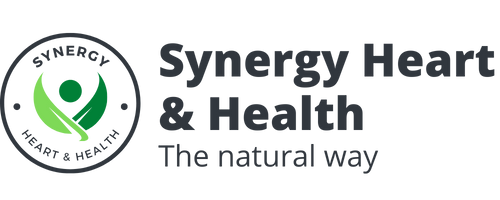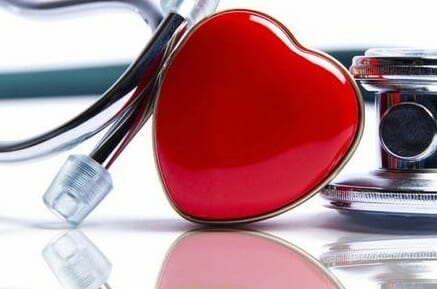Blocked Heart Artery And Heart Disease FAQs
This post will go into detail on the symptoms of a blocked heart artery and look at some heart disease faqs, I will also cover the dangers of blocked arteries, what causes blocked arteries, what treatments are available for blocked arteries, and how to unblock your clogged arteries using a natural product.
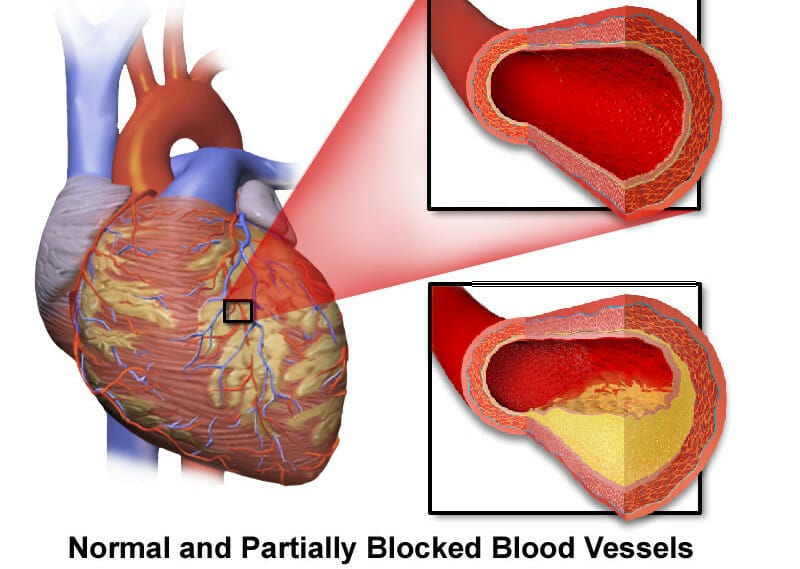
How many arteries go to your heart?
Your heart gets its blood supply from the coronary arteries, there are two coronary arteries the left main coronary artery and the right coronary artery, these branch off at the point where the left ventricle and the aorta meet, both arteries supply blood to all parts of the heart muscle.
The left main Coronary artery
This artery branches into the circumflex artery and the left anterior descending artery, supplying blood to the left atrium, (side and back of the left ventricle) and also supplying blood to the left anterior descending artery (front & bottom of the left ventricle, front of the septum)
The Right coronary artery
This artery branches into the right atrium and posterior descending artery, it supplies blood to the right atrium, right ventricle, and bottom portions of both ventricles at the back of the septum.
The main part of the right coronary artery delivers blood to the right side of the heart, and from there it is pumped into the lungs, the rest of the right coronary artery and its main branches, the posterior descending artery with branches of the circumflex artery go over the surface of the underside of the heart supplying blood to the left ventricle and the back of the septum.
What are arteries?
Simply put arteries are vessels that carry oxygen-rich blood to all areas of the body, arteries carry blood to your heart, your brain to the tips of your toes, and the arteries that go to your heart have a smooth lining in the inner walls so it is easy for blood to flow through them, however, problems start when arteries become clogged.
What causes clogged arteries?
Clogged arteries are the result of years of a substance known as plaque building up on the smooth inner lining of the arteries, plaque build-up or arterial plaque may reduce blood flow or worse still block the flow of blood altogether.
A blocked artery going to the heart or brain can significantly increase the chances of a severe heart attack, stroke, or death, to avoid this happening it is vital to know the symptoms of a blocked heart artery so that it can be diagnosed and treated accordingly.
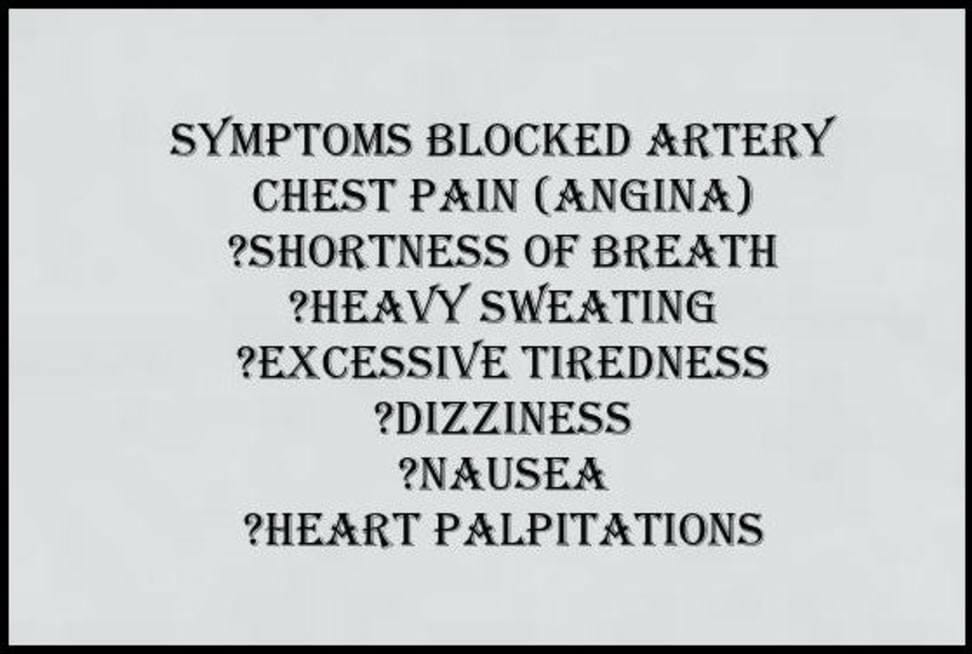
What are the causes of a blocked heart artery?
The biggest issue with a blocked heart artery is plaque build-up, plaque accumulates and sticks to the inner walls of your arteries, not only does plaque accumulate so does calcium, cholesterol, fat, fibrin and cellular waste all combine making it difficult for blood to flow in the normal way.
When this happens, we refer to it as a condition called atherosclerosis, although not a lot is known about how atherosclerosis starts, one thing that is known it causes inflammation in the heart artery causing symptoms of a blocked heart artery.
Does cholesterol play a part?
The inflammation of the heart artery is caused by cholesterol, there are three types of cholesterol, good or HDL cholesterol, bad or LDL cholesterol, and triglycerides, it is thought that significantly high amounts of bad cholesterol and triglycerides are the main reasons for plaque formation in the heart artery, however, the story doesn’t stop there.
Everyone has cholesterol circulation in their blood, some of it is produced naturally and some of it comes from the food that we eat, we need cholesterol to produce cells and other important functions.
HDL or good cholesterol is good because it removes some of the bad cholesterol and disposes of it through the liver, whereas bad cholesterol is bad because it helps in the formation of plaque as does triglycerides.
Other risk factors
Other risk factors that contribute to the symptoms of a blocked heart artery include smoking, diabetes, bad lifestyle, poor diet, bad family history, and stress. Cigarette smoke accelerates the rate at which atherosclerosis spreads in the arteries much in the same way as diabetes increases the risk of plaque forming in the arteries.
Plaque can start to develop in the early teenage years, especially in those with a bad family history, inactive lifestyle, obesity, or with a very poor diet.
What is blocked heart artery symptoms?
Blocked heart arteries mean that the blood supply to the heart isn’t normal, so the heart must work much harder to get blood to the heart, when this happens it leads to symptoms:
- Chest pain (Angina)
- Shortness of breath
- Heavy sweating
- Excessive tiredness
- Dizziness
- Nausea
- Heart palpitations
These symptoms may be caused if the heart artery has a 70% blockage or more, less than that number may mean that there are no symptoms at all.
Chest pain is known as angina, it is the result of reduced blood flow to your heart caused by plaque build-up, in carotid artery disease the carotid artery in the neck may also become clogged with plaque. Symptoms of a clogged carotid artery are known as tia’s (mini-stroke) these may produce the following symptoms:
- Loss of vision on one side
- Slurring of words
- Weakness or numb feeling on one side
- Difficulty moving an arm or leg
Arteries can become blocked in the legs, this is referred to as peripheral artery disease, symptoms may include:
- Cold feet
- Leg pain
- Slow to heal foot injuries
- Gangrene
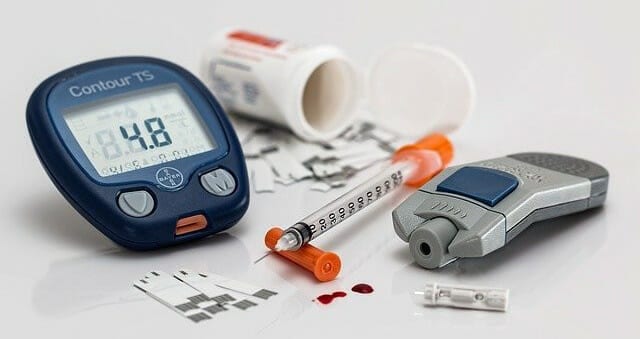
Is there a test for a blocked heart artery?
Should you have any of the above symptoms you need to see a doctor without delay, the doctor will advise you on what tests are needed based on his examination, your symptoms, and medical history:
- Blood lipid screening
- CT scan
- Angiogram
- Electrocardiogram
- PET scan
- MRI scan
- Chest X-ray
- Ultrasound
- Stress test
The most common way to find out exactly where the heart blockage is located is to have an angiogram done, the angiogram is a test that will diagnose a range of cardiovascular diseases, including atherosclerosis, aneurysm, or stenosis. The angiogram will help the consultant to detect abnormalities in the blood vessels, including weaker blood vessels, blood clots, and plaque deposits.
During a traditional angiogram, the doctor will insert a long thin tube known as a catheter in the artery located near the wrist the groin, or the upper thigh. A dye is injected into the catheter at the same time an X-Ray is taken of the blood vessels, and the doctor can see clearly on the monitor where the blockage is.
An angiogram can also be performed using a CT scan or MRI scan, an angiogram is ordered if you have shown signs of a blocked heart artery such as chest pain, you have abnormal stress test results or you already had a stroke or a heart attack, or perhaps heart failure.
How are blocked heart arteries treated?
Depending on the severity of your heart-blocked artery, your overall health, and your family history your doctor will prescribe an appropriate treatment for you that may include:
-
Changes in lifestyle
Being healthy involves not just what you eat but also how you exercise and keep stress to a minimum so your doctor may recommend that you:
- Eat a diet that is low in cholesterol and fats, eat fewer sugars, and consume more carbohydrates like fruits and vegetables.
- Control your weight
- Don’t smoke
- Get at least 40 minutes of exercise each day
- Maintain normal cholesterol and blood pressure
- Maintain blood sugars
2. Surgery or intervention procedures
You may need surgery or an interventional procedure to treat the symptoms of a blocked heart artery, these may include:
- Bypass surgery during this major operation the consultant will take an artery from another part of the body and move it to bypass the blocked heart artery and allow blood to flow normally to the heart.
- Stent a tiny tube known as a stent that may contain medication will be placed through a small tube into the plaque build-up to allow it to open making room for the blood to flow to the heart.
- Balloon angioplasty A small balloon is placed near the blocked heart artery it opens the blockage and the blood will start to flow again.
- Medications going forward you will be given medications to lower your cholesterol and keep your blood pressure under control, aspirin plus other drugs that will keep your blood thin and avoid any dangerous blood clot forming.
Is there a natural way to remove heart artery plaque?
Depends if you believe in natural supplements to remove heart artery plaque, I believe that if you can treat the cause of heart artery plaque build-up by helping your body to produce more nitric oxide it is possible to reduce the heart artery plaque.
Why nitric oxide?
If you could bear with me for a while I will explain, a few years ago 1998 a team of Doctors was conducting a study on heart artery plaque part of their findings centered around inflammation in the arteries and its causes.
Doctor Louis Ignarro was the leading doctor involved, they were so convinced about their discovery “for their discoveries concerning nitric oxide as a signaling molecule in the cardiovascular system” that Doctor Ignarro wrote a book about the importance of nitric oxide about heart disease called ” No More Heart Disease”
What was Doctor Ignarro saying?
After many years of studying the properties of nitric oxide and its effect on the cardiovascular system, Dr. Ignarro concluded that nitric oxide is a potent vasodilator or vasorelaxant produced in the endothelial cells in the vascular system. Nitric oxide functions to decrease vascular smooth muscle tissue and suppress platelet aggregation. He along with his colleagues was awarded the Nobel prize in Physiology or Medicine in 1998.
What does this mean for a blocked heart artery?
Nitric oxide keeps our blood vessels healthy, it is a chemical produced in the endothelium a tiny part of the lining of the blood vessels it is very responsive to regular exercise, lowers cholesterol, and heart-healthy habits, by lowering your cholesterol you increase nitric oxide levels. Increased nitric oxide levels help to expand blood vessels and make us feel healthier, nitric oxide also plays a part in curbing the plaque build-up in the arteries. (it is also used in a nitroglycerine heart spray)
When we age our bodies can’t make as much nitric oxide as we would need problems happen when nitric oxide levels fall, fatty plaque deposits start to form and stick to the endothelial (the inner lining of the artery) this causes all sorts of problems for the heart because it is unable to get enough blood supply to the heart making the possibility of a heart attack or stroke more than likely.
How to help your body make more nitric oxide?
Nitric oxide is available in a powder supplement form in this heart artery product called HealthyFlow™ the product was formulated by the good people at Good Health Naturally to help people with heart artery disease. The whole basis of this natural product is to improve blood flow by helping the body create more nitric oxide that can work to reduce heart artery plaque
HealthyFlow™ is an important amino acid and contains a unique formula for circulatory support and brain health, it is easily absorbed because it contains a proprietary formula that has been shown in human trials to significantly improve and promote the absorption of amino acids, vitamins, and glucose.
HealthyFlow™ contains a nitric oxide precursor called L-Arginine. L-Arginine is the secret to providing your body with the necessary nitric oxide to reduce your blocked heart artery. Take one scoop each day with water on an empty stomach.
References:
https://www.medicalnewstoday.com/articles/326825
https://www.nobelprize.org/prizes/medicine/1998/ignarro/facts/
Early symptoms of heart disease
You should be aware of the early symptoms of heart disease because heart disease is known as a silent killer even though you may or may not have any symptoms.
Heart disease is something that develops over sometime in some cases the process can start as early as your thirties.
You may not even realize that heart disease has started because you may not notice any warning signs,
The early symptoms of heart disease will vary from person to person and may not be obvious. It’s important to look out for certain symptoms like shortness of breath, chest pain or swelling in your ankles, these symptoms could be a signal that something is wrong.
By paying attention to these early warning signals you give yourself every chance of treatment that will help to prevent you from having a heart attack or stroke.
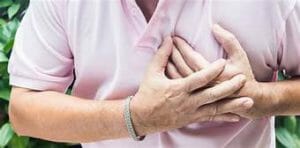
Heart attack scenario
When you see a heart attack scenario on the TV usually a guy is seen walking down the street and he looks normal, suddenly he puts his hand to his chest and grimaces with pain, then he falls to the ground.
However, in real life, this isn’t always the case, we know that a heart attack can happen without any warning however the above scenario is less common than you think.
What is common is that most heart attacks will have warning signs according to the director of the Heart & Vascular Program at the Texas Health department in Dallas.
I had no symptoms apart from feeling very tired leading up to my heart attack at age 45, I had no idea that I was a ticking time bomb just waiting to go off, sure my cholesterol was high my blood pressure was normal but it didn’t stop me from almost dying from a massive heart attack.
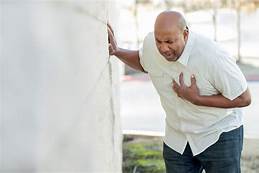
Chest discomfort
Some people that have had heart attacks have described a feeling of chest discomfort, if you feel a heaviness or discomfort in the chest area you should get it checked out.
I used to consider myself pretty healthy until it happened cardiovascular disease is far more common than you might think, the American Heart Association has reported that 50% of US citizens have cardiovascular disease of some kind.
Cardiovascular disease is responsible for most deaths across the world.
What cardiovascular disease and heart disease what is the difference?
Cardiovascular disease or CVD is a disease that affects the blood vessels and the heart whereas heart disease is a disease that affects the heart.
A good example of cardiovascular disease is peripheral artery disease where the blood vessels going down to the legs become blocked with something called plaque.
Plaque is made up of cholesterol, fat, calcium, dead cells other gunk, and calcium, the symptoms of PAD are severe leg pain when walking, high blood pressure and stroke are other examples of cardiovascular disease.
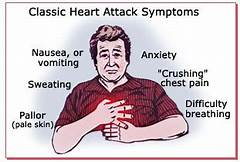 Heart disease examples
Heart disease examples
Examples of heart disease are angina, arrhythmia, coronary heart disease, heart failure, and valvular heart disease. Heart disease is also described as cardiac disease.
The statistics in 2019 from the United States and the American Heart Association point to an increase in high blood pressure-related cases over 116 million (46%) of adults have hypertension.
The report goes on to show that a person dies from cardiovascular disease every 38 seconds, that’s about 2,303 people every day, in second place stroke kills someone every 3.7 seconds that’s about 390 deaths each day.
High blood pressure is closely related to heart and cardiovascular disease.
Palpitations
Most heart palpitations are harmless because they are caused by stress, anxiety, dehydration, or too much coffee intake, however, in some cases, it may be a signal of a problem with the heart.
A good example would be if you are resting and watching TV and suddenly out of nowhere, your heart starts to beat rapidly or irregularly you should report this to your doctor.
Shortness of breath
When you push yourself physically, for example walking fast or climbing stairs, you may feel out of breath for a while, it’s normal to put this down to not being fit however if it is a regular occurrence don’t assume it’s because of a lack of fitness it may be something more sinister going to a doctor.
Aches and pains
Coronary heart disease means that you have blockages in your arteries and veins, these blockages put pressure on your heart to pump much-needed blood around your body.
When your heart is under pressure you may feel pain in your chest, however, this isn’t always the case, sometimes you may feel pain in your shoulders, back, arms, jaw, and abdomen.
If you feel pain in these parts of the body, especially after exercise and then it goes when you rest go see a doctor it may well be the early symptoms of heart disease.
Physically exhausted

This happened to me and I didn’t pay any attention at the time, I was feeling so tired for several months but I put it down to my workload at the time, how wrong could I be?
If you have been feeling like this it could be the case that you feel this way because the primary artery called the left ventricle artery responsible for carrying the blood throughout your body may be partially blocked.
If the left ventricle may become weak and there will not enough flow of blood to circulate throughout the body, to make up for this deficiency the body diverts blood going to the muscles and sends all of it to the vital organs the heart and brain.
As a result, you may feel very tired or physically exhausted even though you may have slept well.
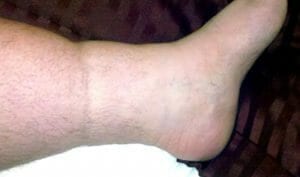 Swelling in the feet and ankles
Swelling in the feet and ankles
Swollen feet or ankles may be an early symptom of heart disease or heart failure, it could also be caused by insufficient blood flow to the legs (venous insufficiency) side effects of a drug especially calcium channel blockers or it could be the result of kidney disease, too much salty food, or liver failure.

Problems in the bedroom
Damage to the blood vessels in the penis means that when aroused you are probably going to find it more difficult to get an erection or to maintain one.
A full erection means that enough blood is flowing into the penis making it hard and firm.
The damage could be caused by a build of plaque suggesting that there could be damage to your heart as well, if these symptoms persist it may be a signal of heart disease once you rule out things like stress and tiredness.

Snoring
Loud snoring and waking up gasping for air or you feel very tired even though you went to bed at a very reasonable time could mean that you have a condition called sleep apnea.
A snoring disorder is marked by loud snoring and pauses in breathing.
If not treated it may increase your risk of a heart attack. The issue is that these breathing pauses can have a serious effect by stressing your body, your blood pressure may rise, and your heart may start to beat irregularly, all combined making having a heart attack more than likely.
Nauseous
Have you ever felt nauseous you just feel like burping to get rid of that feeling, it may be just a stomach bug, however, it may also be a signal that something isn’t quite right with your heart?
According to a senior microbiologist, the nerves in your heart are closely linked to the nerves in your gastrointestinal tract.
So you may think that it’s just a stomach bug but it may be something more sinister, how you can tell the difference is nausea that is caused by an oncoming heart attack will feel worse when you exert yourself and will ease when you are testing.
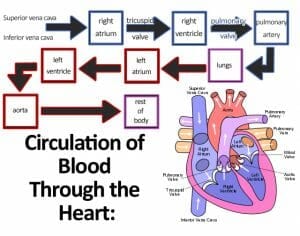
Bloating
For some people it’s easy to become bloated following a meal or from drinking a liquid, just remember bloating may also be caused by congestive heart failure.
This type of heart disease happens because the heart has become too weak and can’t pump enough blood around the arteries and veins, a side effect of this is a build-up of fluid in every part of the body.
According to the American Heart Association, you may feel swelling in your legs, ankles, feet, or your stomach, if these symptoms appear suddenly please make an appointment with your doctor.
Heart infection
There is an infection that affects the innermost membrane separating the valves and chambers of the heart, the infection is called endocarditis and the symptoms may include;
- Shortness of breath
- Dry persistent cough
- Swelling in your abdomen or legs
- Fatigue or weakness
- Fever
- Unusual spots or skin rashes
What are the signs of an oncoming heart attack?
Anxiety may cause blood flow to the heart to reduce, a study showed that females who suffered from anxiety experienced a reduction in blood flow to their hearts compared to another group that didn’t have anxiety issues.
Signs of anxiety may cause more or less the same symptoms as those of a heart attack, for example, shortness of breath, heart palpitations, and chest pain.
Don’t confuse the two if you have those symptoms mentioned don’t delay get straight to your doctor.
Remember any delay in a diagnosis and treatment potentially could cause a heart attack or stroke, in some cases, it could be fatal.

Photo by Online Marketing on Unsplash
What should you do if you have early symptoms of heart disease?
If you have any of the symptoms mentioned above, it doesn’t mean that you are in imminent danger, however, it does mean that you should go and visit your doctor promptly.
Remember in some cases of heart disease symptoms time is of the essence, so don’t delay.
If you are experiencing any of these symptoms (chest tightness, chest pressure, shortness of breath, so-called indigestion, discomfort in your arms, neck, legs, or jaw, or lightheadedness) for some time and you don’t feel good or you feel extremely tired call the emergency services immediately you may be in grave danger.
I say this from my own experience of not taking my doctor’s advice resulting in a massive heart attack that I was just blessed to survive.

How to prevent a heart attack
High cholesterol, high blood pressure, stress, family genes, and obesity are some of the contributing factors to heart disease.
Many of these you can do something about, don’t leave it until it’s too late, get some exercise regularly, watch the foods that you eat, keep your blood pressure under control, don’t get stressed, drink in moderation, and keep your body weight within acceptable limits.
I nearly forgot if you smoke give them up, cigarette smoke blocks your arteries and may lead to heart disease.
https://professional.heart.org/professional/ScienceNews/UCM_503383_Heart-Disease-and-Stroke-Statistics—2019-Update.jsp
Related Articles:
What dissolves plaque from arteries?
Natural heart health supplements
